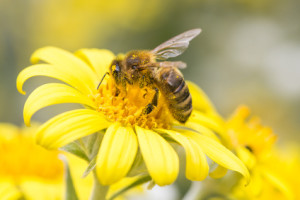 We’ve all seen it on television, in the newspapers and on the Internet, the devastation that insect pollinators have suffered mostly at the hands of man through destruction of their habitat and relentless use of pesticides.
We’ve all seen it on television, in the newspapers and on the Internet, the devastation that insect pollinators have suffered mostly at the hands of man through destruction of their habitat and relentless use of pesticides.
Native bees, such as bumble bees, have suffered greatly mostly by the indiscriminate use of pesticides. We depend on these pollinators to provide one-third of the foods on our dinner tables, most notably fruits and vegetables. Fruit and vegetable bearing plants depend on insects to exchange pollen from flower to flower in order that the fruit or vegetables will form on the plants. While it is true that many plants, such as tomatoes and blueberries, are self-fertile, a visit by native pollinators produces more fruits and bigger fruits.
So what can we do?
Grow flowering plants that pollinators will want to visit. Be sure that early spring bloom is available for native insects such as the solitary mason bee that forage much earlier in spring than honey bees. By planting a variety of plants to take the bloom season through summer and early fall, the result will be life-giving nectar for a long period of the growing season.
Monarda, or Bee Balm, is a good source for the pollinators as it replenishes its nectar quickly. Milkweed is also a good choice for other pollinators such as butterflies. Other good plants to incorporate into the garden are perennials such as Coneflower, Allium, Blanketflower, Russian Sage, Meadow Sage and Lavender as well as herbs such as chives, sage, thyme, rosemary and mint. Cosmos and Zinnias are perfect to add all summer color.
Even though conclusive proof of harm is yet lacking, some anecdotal evidence suggests that the neonicitinoid group of insecticides cause significant problems for pollinators. For this reason, spray no pesticides while pollinators are foraging as even organic pesticides, such as Neem Oil, are deadly to bees. Also be very careful applying any insecticides in the neonicitinoid class to plants that bear flowers visited by pollinators.
Place shallow trays of water in the garden, or better yet, some mud puddles that will provide water by drinking and mud for the nest building. The idea is to create a pollinator food station. Many native bees will display their loyalty by not straying far.
Let’s work together to save the pollinator population!